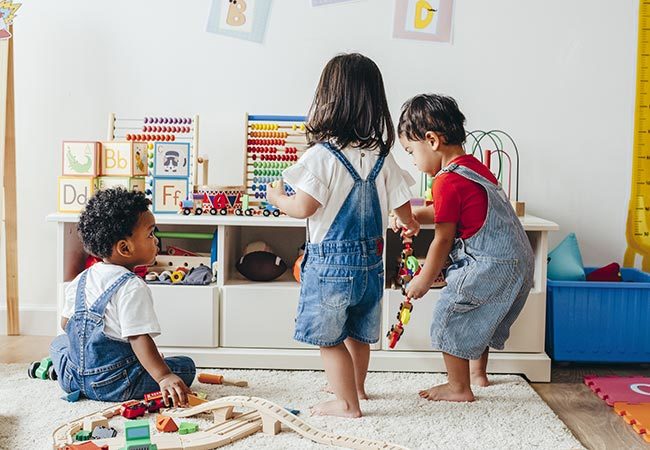
Preschool Acceptance Requirements
Preschools will vary on their requirements for accepting new children, and both parents and providers should be mindful of this when deciding if a child is ready for enrollment. Some preschools require that new students be at least 3 years old and are potty trained, while others are more flexible on this.
Parents are advised to start researching and visiting schools one year before they expect their child to attend. It is common for preschools to begin accepting applications in January, but again, it will vary with each school.
Some preschools are stricter than others when it comes to acceptance dates and the milestones a child needs to reach in order to be “accepted,” so it’s important that parents and caregivers work together to find the best fit.
How to Decide If a Child Is Ready to Start Preschool
Here are a variety of questions to consider when deciding if a child is ready to start preschool.
How Old is The Child?
Start at the most basic level and acknowledge the child’s chronological age. Most parents want to start their child in preschool two years before they would start kindergarten. Preschools sometimes have a minimum age for when they will accept a child. Typically, they need to be 3 by December of the academic year, however, there are preschools that will take children as young as 2. There are of course, plenty of reasons to delay a child’s enrollment. It’s not unusual that a parent of a child with a “late” birthday decides their child isn’t quite developmentally ready and will wait an extra year. Know that age is not a definitive indicator of classroom readiness so it’s important to look at the child’s growth as a whole.
Is the Child Potty Trained?
Although some preschools are happy to help with potty training, some will require that this skill is mastered before enrollment. Being potty-trained is a sign of developmental growth, and often a positive signal a child is ready for preschool. Some other basic skills a child may want to master before preschool is washing their hands and eating lunch independently. Child care providers should have these requirements established beforehand and keep them in mind when reviewing applications.
Can They Follow Directions?
Preschools are not known for super strict rules, but it is expected that a child can follow simple instructions. Things like clean up time, walking in a line with the rest of the class, and following snack time rules are all things you can expect to be asked of a child. If parents have any doubts, preschools should encourage them to practice with their child at home. Simple things like cleaning up toys and staying seated at snack time are good ways to see how a child is responds to instructions.
Do They Interact Well with Other Kids?

How does the child interact with other kids? Parents should take a look at how they interact with siblings, relatives, and other neighborhood children.
It’s important to set up playdates or involve a child in local playgroups to make sure they get along with others and not feel overtly overwhelmed in a social setting. Preschools can also offer open houses which provide an opportunity for children and parents to meet potential new classmates.
Does the Child Take Long Naps?
If a 2-year-old still needs 2 hour naps each afternoon, they may not be developmentally ready for the activity-level present at a preschool. Although preschools will incorporate nap times into the day, it’s important to acknowledge a child may not sleep as well as they would at home, so consider if a child has the stamina to get through scheduled activities.
How Does the Child Handle Transition?
One of the most critical things to consider. Going to preschool for the first time can be scary for a lot of little ones, and although most fears diminish after a few days, others may not be ready for the transition.
Preschools often have set schedules, so parents may want to practice going from one activity to the next with their child at home. Things like “After coloring in this flower, it’s time to sit down for lunch” is a helpful way to prepare a child for the kinds of activity transitions they’ll face at preschool. Preschools can help set expectations by posting a “typical day” on their website or in email correspondence.
Has This Child Successfully Been Away from a Parent Before?
The first few days of preschool are not easy – for the child or the parent – and preschool could be the first time they are separated for an extended period of time. While it is our hope a child will be having too much fun for there to be any separation issues, there’s a lot of ways parents can prepare your child beforehand and ease your own worries.
From letting a grandparent watch your child while you run to the grocery store or having a neighbor watch tv with them while going on a quick bike ride, children and parents will be better able to handle the separation when it comes.
Preschools can also consider something like Procare where child care providers can send daily reports, photos, and activity information so parents can stay connected to their children throughout the day.
Final Thoughts
Enrolling a child in preschool is a big decision for parents, and child care providers have a lot to consider during the application process in terms of milestones, and the physically and emotional readiness of the child in question.
The importance of preschool and how it contributes to a child’s early development should not be overlooked. Parents and child care providers need to work together to decide if a child is ready for this exciting next step.
Learn how Procare helps thousands of preschools across the country manage their programs.




